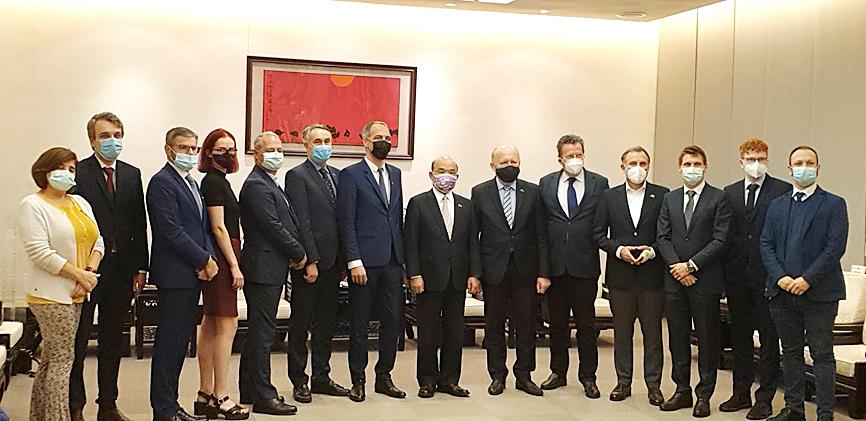The European Parliament’s first delegation to Taiwan arrived yesterday in the nation for discussions on fighting disinformation, with delegation members scheduled to meet President Tsai Ing-wen (蔡英文) today.
The 13-person delegation is visiting Taiwan on a three-day trip, the Ministry of Foreign Affairs said.
The delegation includes seven members of the “Special Committee on Foreign Interference in all Democratic Processes in the European Union, including Disinformation”: committee president Raphael Glucksmann of France, Andrius Kubilius and Petras Austrevicius of Lithuania, Marketa Gregorova of the Czech Republic, Andreas Schieder of Austria, Georgios Kyrtsos of Greece and Marco Dreosto of Italy, the ministry said.

Photo: Lee Hsin-fang, Taipei Times
“The delegation will discuss Taiwanese experiences in [the] fight against disinformation; attempts at interference in Taiwanese democracy, media, culture and education; as well as Taiwan’s efforts to reinforce its cyberresilience,” the European Parliament said in a news release.
“Taiwan uses innovative tools and involves the whole Taiwanese society to address all types of interference in its democracy, without restricting freedom of speech and media,” it said.
It is the first time the European Parliament has sent an official delegation to Taiwan, which is significant, Presidential Office spokesman Xavier Chang (張惇涵) said in a statement, adding that Tsai would meet with them at the Presidential Office this morning.
This year, the European Parliament has passed 12 resolutions friendly to Taiwan, showing that Taiwan-EU relations are becoming ever closer, Chang said.
Yesterday, the delegation met with Premier Su Tseng-chang (蘇貞昌), the ministry said, adding that Deputy Minister of Foreign Affairs Harry Tseng (曾厚仁) was to host a banquet for them on behalf of Minister of Foreign Affairs Joseph Wu (吳釗燮).
The delegation would attend a news conference at a hotel in Taipei tomorrow, the ministry added.
European Union Centre in Taiwan executive director Marc Cheng (鄭家慶) told the Taipei Times by telephone that while other European lawmakers have visited, this group got more attention due to the timing and nature of the visit.
The special committee was just created last year, and its members are visiting Taiwan at a time when Taiwan-US-China relations are changing and after the EU released a report titled The EU Strategy for Cooperation in the Indo-Pacific, he said.
While the European Parliament is playing an increasingly important role in the bloc and can influence its budget, whether its resolutions can sway the EU’s overall policies remains to be seen, he said.
Nonetheless, Taiwan-related issues are certainly grabbing more attention across Europe, he said.

CHAOS: Iranians took to the streets playing celebratory music after reports of Khamenei’s death on Saturday, while mourners also gathered in Tehran yesterday Iranian Supreme Leader Ayatollah Ali Khamenei was killed in a major attack on Iran launched by Israel and the US, throwing the future of the Islamic republic into doubt and raising the risk of regional instability. Iranian state television and the state-run IRNA news agency announced the 86-year-old’s death early yesterday. US President Donald Trump said it gave Iranians their “greatest chance” to “take back” their country. The announcements came after a joint US and Israeli aerial bombardment that targeted Iranian military and governmental sites. Trump said the “heavy and pinpoint bombing” would continue through the week or as long

TRUST: The KMT said it respected the US’ timing and considerations, and hoped it would continue to honor its commitments to helping Taiwan bolster its defenses and deterrence US President Donald Trump is delaying a multibillion-dollar arms sale to Taiwan to ensure his visit to Beijing is successful, a New York Times report said. The weapons sales package has stalled in the US Department of State, the report said, citing US officials it did not identify. The White House has told agencies not to push forward ahead of Trump’s meeting with Chinese President Xi Jinping (習近平), it said. The two last month held a phone call to discuss trade and geopolitical flashpoints ahead of the summit. Xi raised the Taiwan issue and urged the US to handle arms sales to

BIG SPENDERS: Foreign investors bought the most Taiwan equities since 2005, signaling confidence that an AI boom would continue to benefit chipmakers Taiwan Semiconductor Manufacturing Co’s (TSMC, 台積電) market capitalization swelled to US$2 trillion for the first time following a 4.25 percent rally in its American depositary receipts (ADR) overnight, putting the world’s biggest contract chipmaker sixth on the list of the world’s biggest companies by market capitalization, just behind Amazon.com Inc. The site CompaniesMarketcap.com ranked TSMC ahead of Saudi Aramco and Meta Platforms Inc. The Taiwanese company’s ADRs on Tuesday surged to US$385.75 on the New York Stock Exchange, as strong demand for artificial intelligence (AI) applications led to chip supply constraints and boost revenue growth to record-breaking levels. Each TSMC ADR represents

State-run CPC Corp, Taiwan (CPC, 台灣中油) yesterday said that it had confirmed on Saturday night with its liquefied natural gas (LNG) and crude oil suppliers that shipments are proceeding as scheduled and that domestic supplies remain unaffected. The CPC yesterday announced the gasoline and diesel prices will rise by NT$0.2 and NT$0.4 per liter, respectively, starting Monday, citing Middle East tensions and blizzards in the eastern United States. CPC also iterated it has been reducing the proportion of crude oil imports from the Middle East and diversifying its supply sources in the past few years in response to geopolitical risks, expanding